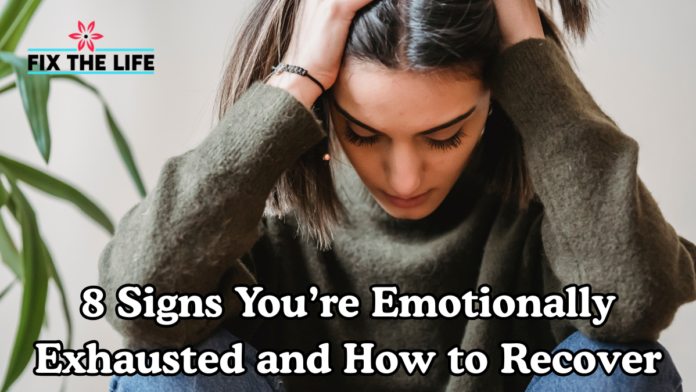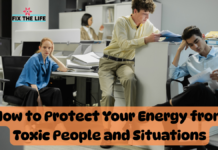Emotional exhaustion doesn’t hit like a lightning bolt—it creeps in slowly. One day, you’re just tired. A few weeks later, you’re snapping at people, struggling to focus, and feeling numb. If that sounds familiar, you’re not alone.
Recognizing the signs you’re emotionally exhausted is the first step toward reclaiming your energy and peace of mind. Below, we break down eight common symptoms of emotional burnout and offer practical, evidence-based recovery strategies.
How to Recover When You Are Emotionally Exhausted
1. You’re Constantly Tired, No Matter How Much You Sleep
This isn’t just physical tiredness—it’s emotional fatigue. You can sleep eight hours and still wake up feeling drained.
Why it matters: Chronic stress taxes your nervous system, making rest less restorative.
Mental fatigue tip: Prioritize deep rest. That means not just sleep, but quiet time without screens or stimulation. Try meditation, yoga, or simply sitting with a book for 30 minutes.
2. Small Tasks Feel Overwhelming
Folding laundry, replying to emails, even getting out of bed—when emotional exhaustion sets in, everyday responsibilities feel like mountains.
Emotional burnout symptom: A loss of motivation for tasks you once handled easily.
Recovery move: Break tasks into micro-steps. Instead of “clean the kitchen,” start with “put dishes in the sink.” Momentum builds confidence.
3. You Feel Detached or Numb
You’re going through the motions, but nothing moves you. Happy events feel flat. Sad moments don’t hit like they used to.
What’s happening: Emotional burnout causes a shutdown of the body’s stress response, leading to detachment as a defense mechanism.
Reconnection strategy: Schedule time for activities that used to bring joy, even if they don’t spark excitement right away. Emotions often return with gentle repetition.
4. You’re Easily Irritated or Emotionally Reactive
Things that wouldn’t usually bother you suddenly trigger anger or tears. It’s not just moodiness—it’s a warning signal.
Real-world relevance: High stress reduces your emotional regulation capacity, making outbursts more likely.
Mental fatigue tip: Build buffer zones into your day—5–10 minute breaks between meetings, tasks, or conversations to reset your emotional state.
5. You Struggle to Concentrate or Make Decisions
Emotional exhaustion compromises executive function. Your brain is tired, making focus and clarity hard to access.
What this means: You might find yourself zoning out in conversations, forgetting details, or second-guessing every decision.
Recovery strategy: Use structured planning—write things down, simplify your calendar, and avoid multitasking. Give your brain space to process.
6. You’ve Lost Interest in Social Interaction
Isolation is both a symptom and a cause of burnout. When you’re emotionally exhausted, even talking to friends can feel like too much.
Watch out: Avoiding social interaction for extended periods can deepen mental fatigue.
Rebuild gently: Reach out to one trusted friend. Choose low-pressure interactions like a quiet walk or a phone call instead of big group settings.
7. You Feel Like You’re Running on Empty Emotionally
You’re there for others, but no one’s there for you. You feel depleted, invisible, or resentful.
Core issue: Chronic emotional giving without receiving or resetting leads to burnout.
Self-repair step: Start setting boundaries. Say no when needed. Protect your time and emotional bandwidth with intention.
8. You Feel Hopeless or Apathetic About the Future
When you’re burned out emotionally, the future can look blurry—or bleak. You might feel stuck, aimless, or like nothing will change.
Important note: This isn’t weakness—it’s a sign you’ve been carrying too much for too long.
Healing strategy: Reconnect with purpose in small ways. Volunteer. Revisit old goals. See a mental health professional if hopelessness lingers.
FAQ
What causes emotional exhaustion?
It’s usually the result of prolonged stress—whether from work, relationships, caregiving, or internal pressure. It builds over time and impacts both mind and body.
How long does it take to recover from emotional burnout?
Recovery varies. With consistent rest, boundaries, and support, you can feel improvement in a few weeks. Deeper burnout may require professional help and longer healing.
What’s the difference between emotional exhaustion and depression?
They overlap, but depression is a clinical condition. Emotional exhaustion is typically stress-related and may improve with rest and behavioral changes. If symptoms persist, seek professional evaluation.
How can I prevent emotional burnout in the future?
Set regular boundaries, take scheduled breaks, prioritize sleep, and check in with your emotional needs weekly. Prevention is ongoing, not one-and-done.
Final Thought
Emotional exhaustion is a sign—not of weakness, but of effort. You’ve been running on empty because you care, because you try, because you’ve kept going even when it was hard. That deserves compassion, not criticism. The moment you notice the signs you’re emotionally exhausted, you give yourself the power to heal. Take it one step at a time. Recovery isn’t a sprint—it’s a return to yourself.




